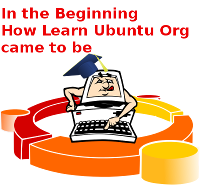Who We Are, The Story of Learn Ubuntu Org
 This narrative describes who we are at learn Ubuntu Org Inc. It describes how we formed, our mission,our goals and our dreams to make the world a better place, one student at a time.
This narrative describes who we are at learn Ubuntu Org Inc. It describes how we formed, our mission,our goals and our dreams to make the world a better place, one student at a time.
1. Our Beginning
 |
Bringing Technical Skills to Developing Countries |
|
|
|
All of our courses are categorized as Beginner, Intermediate, or Advanced. You can view our Course Outlines in the Section of this Series coming up next. |
|||
|
All of our courses are based on the Ubuntu Linux system which is freely available to anyone at no charge. All of the applications we teach that are used on Ubuntu are also GNU based software and are made available freely by the Free Software Foundation. The basis of free software is that it supports a foundation of a learning and sharing society where the tools we all use are free to share, study and modify. This makes the user free and unencumbered by expensive software licenses and patents. Furthermore this does not have to be limited to Africa as these course could be used in any developing country, such as the Philippines, where I shall be moving in less than 4 years. Courses such as these can bring this technology into the hands of people in countries such as this without the high price tag of commercial software licensing. For example, from my personal experience in visiting the Philippines, I noticed that they are severely lacking in technical knowledge and a simple point of sale system. It took me 3 hours to purchase supplies at a local distributor to paint my in-laws home last year. Here is a list of some of the things that we take for granted here that could all be implemented through the use of Ubuntu Linux in developing countries:
Items such as the above mentioned could lead to jobs under some of the following categories:
Initially we are looking for funding to cover the cost of publishing the course materials for the courses and distribution. We could offer each course at a low cost per student with the money we raise to be divided among ourselves and other contributors to offset the initial startup costs. Students could apply to our foundation for scholarship based on their grade scores. A majority of these courses could be delivered by a combination of web based technology and Instructor led courses. In my previous experience we ran courses where we trained the instructors who oversaw the grading and attendance process to keep everything manageable and accountable. We are also looking for accredited learning Institutions who may be interested in offering certificates for students who succeed in passing these courses. Having an American Educational Institution involved lends further credibility to the course value for the students. The mechanics of getting all of this started is still to be determined but once established the ongoing costs can be structured as such via web based technology so that a cost per student can be low enough to have this system fully self sustainable within 2 years. So far I am a like a one-armed paper hanger but the project continues nonetheless For more information please contact us, info@learnubuntu.org |
|||

